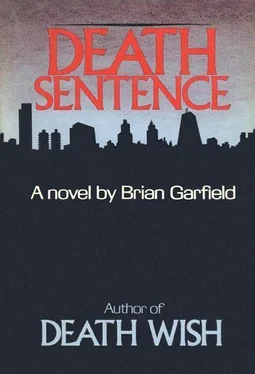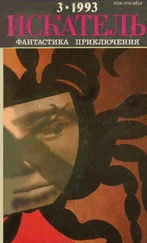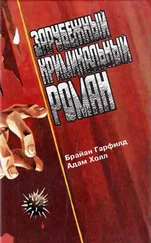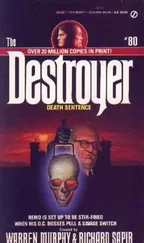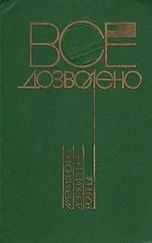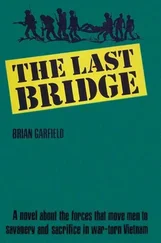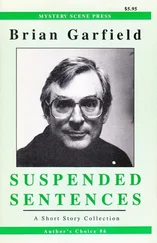Paul turned in the chair and watched him. Harry was leaning forward on his walking stick, both hands clasped over the knob, chin almost resting on hands. “After Irene it began to collapse for you. You must have been asking yourself, ‘What kind of a monster am I?’ You’ve begun to see how extremes can create and feed upon each other. You’ve been educating yourself, slowly, in what Victor Mastro and a great many others already know: vigilantes don’t solve any problems — they only create new ones.”
“Am I supposed to be impressed by your rhetoric? I’m tired. What’s the bottom line?”
“It’s time you quit. You tried an experiment, it didn’t work out — you found a drug that cures the disease but kills the patient. Too many side effects. You didn’t know that before, but you know it now. If you keep going, more innocent people will suffer. Things inside you will compel you to make mistakes until they find you and put you away; or you’ll get killed by one of your intended victims, the way it almost happened with that man with the machete, because you’ll get careless out of a subconscious need for punishment.”
“That’s ten-cent Freudianism.”
“It will be agony for you to live with your conscience either way. But if you give it up immediately, at least you’ll know you tried to correct your mistake as soon as you discovered it.”
The old man stood up, putting his weight on the walking stick as he rose. “I’m not telling you anything you haven’t told yourself. But it may help to have had me put it into words for you.”
Paul looked aimlessly away. He felt a forlorn emptiness. Harry wasn’t finished. “Vigilantism isn’t the only thing you’re going to have to give up.”
“No?”
“I’m talking about Irene.”
Rage pushed him out of the chair. “I’ve had about enough...” But his voice trailed off and the anger flowed out of him as if a drainplug had been pulled. He only stood and brooded at the old man.
“You’d never be able to tell her. It would build a wall between you. Every time she said something that reminded you of it, even remotely, it would drive you farther apart. You see how it has to end.”
“Good Christ,” he whispered.
“Consider it part of your penance.”
“Don’t be glib with me.”
“I’m not trying to patronize you, Paul. But there’s something in the ancient concept of justice. We usually end up making some kind of payment for our transgressions. It’s not a metaphysical thing, it’s something basic in nature — the balance of opposites, what the Orientals call yin and yang. You’re going to suffer, whatever happens. You may as well accept that. And there isn’t much point in forcing Irene to suffer with you.”
He couldn’t stand still. He shuffled to the window and drew the blinds; he stared without seeing and then he turned toward the old man. “You made a bet with Irene that the vigilante would retire.”
“Yes.”
“Now you’re trying to win your fifty dollars.”
“I always hate to lose a bet.” Harry picked up his deerstalker. “It’s on Irene’s account I came. I’m rather fond of her in my spinsterly fashion. I wanted to spare her some of the anguish, if I could.”
Harry smiled, surprisingly gentle. “Also, of course, I wanted to confirm my deductions.”
“And you think you have.”
“I know I have.”
“Then why not turn me in?”
“I gave it a good deal of thought.”
“And?”
“She’s told me what happened to your wife and daughter.”
“What’s that got to do with not turning me in?”
“If the same thing had happened to my wife and my daughter, I can’t be absolutely certain I wouldn’t have reacted the same way.”
“Is that sufficient grounds for you to withhold knowledge of a crime?”
“I’m breaking no law. You’ve admitted nothing to me in so many words. I’ve withheld no evidence — only the conclusions I’ve reached from observation.”
“You’re splitting hairs, aren’t you?”
“Are you trying to persuade me to turn you in?”
“I only want to be sure where you stand.”
“You’re in no danger from me. Not in the sense you mean.”
“In what sense, then?”
“If you go on killing you’ll destroy yourself. That’s the danger. You’ll destroy an incalculable number of innocent lives as well.”
“They’re destroyed every day by those animals in the streets.”
“Ah, yes, but that’s not the same thing — those aren’t your crimes.”
“They are if I stand by and let them happen.”
“Edmund Burke again, yes? ‘The only thing necessary for the triumph of evil is that good men do nothing.’ But Burke didn’t counsel people to commit murder, did he.”
Harry moved walrus-like to the door. He couldn’t get it open; Paul had to snap the locks for him. It brought him within a handbreadth of the old man. Harry’s eyes were kind. “I’m sorry, Paul.”
Then he was gone.
Paul shut the door and bolted the locks.
You play the cards you’ve been dealt.
He sat motionless, bolt upright, not stirring and not reckoning the passage of time.
The telephone.
It drove him to his feet in panic and alarm. He stared at the instrument while it rang. It went on ringing; he didn’t move.
It would be Irene. He couldn’t talk to her now. He waited, wincing. It rang an incalculable number of times before she gave up.
Afterward the silence was terrifying.
He put his car in the spiral-ramp garage. It was nearly empty; the Loop was deserted on a Sunday; he walked to the shabby building and climbed the stairs, focusing on the chipped linoleum. Let himself into the office and sat behind the desk with his fist knotted. His face turned toward the filing cabinet where the guns were.
He had to think. It was imperative. But a paralyzing numbness had set in and he kept flashing on moments of terror that jumbled in his mind like falling bricks: bloody machete looming above him, striking forward; gunsights leveling on the purse-snatcher while the old Jew moved into range; staring eyes of the blind girl.
And Harry Chisum, his voice as mild and dry as wind through autumn leaves: You’re the vigilante.
He was drawn to the cabinet. He slid the drawer open and stared down at the guns. Dull gleam of machined metal: silent motionless things squatting in the shadows of the drawer like deadly twin embryos.
He smote the drawer with his shoe, slamming it shut with terrible force. Within, the guns skidded across the thin metal and crashed against the back of the drawer, making it ring like a crashing car.
On a desperate impulse he lunged for the telephone but the receiver was dead: they hadn’t connected it yet. He slammed it down.
Then reason pried up a corner of his desperation. He got out his handkerchief and scrubbed the telephone frantically. What else had he touched? He couldn’t remember. He scraped the handkerchief along the arms of the chair, the top of the desk, the knobs on both sides of the door. He looked around.
The filing cabinet. He wiped down the drawer and its handle. Had he touched the guns with his bare fingers?
No; he’d only stared at them. He went to his coat and got out the rubber gloves and put them on.
He sank back in the chair, drained. He had to think.
The sun began to filter through the sooty windows. He watched the line between light and shadow. Imperceptibly it fanned across the floor, approaching the desk.
His mind was running very fast like a runaway engine that had burned out its brakes. Words and images clashed kaleidoscopically without connection or transition. He felt helpless — a chip in a hurricane. It debilitated his body: he had the feeling he couldn’t rise from the chair. Sensations of drowning.
Читать дальше
